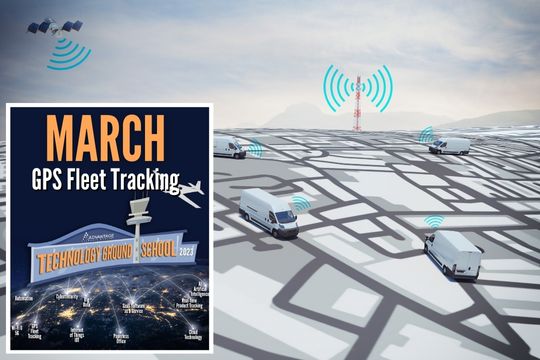If you oversee a fleet of trucks or vehicles and you want to optimize your fleet, GPS fleet tracking is an essential tool.
The Global Positioning System (GPS) tracks the location of your assets using a network of satellites and relays the information in real-time to your home office. The real magic happens when you pull this data into a software that provides a live overview of your fleet and allows you to make informed decisions. By seeing the whole picture, you may discover unauthorized use, dangerous driver behavior, or inefficient driving routes that can increase risk and cost your business a lot of money.
Incorporating GPS tracking can provide two-fold benefits in terms of saving money:
- Reduce Insurance Premiums: Utilizing a GPS tracking system can help lower a driver’s Compliance, Safety, and Accountability (CSA) score, which can reduce insurance premiums. When drivers know they are being monitored, they tend to drive more responsibly, minimizing reckless driving, speeding, tailgating, and unnecessary incidents.
- Reduce Business Expenses: Drivers can access the most direct routes to jobs, reducing fuel costs and wear and tear on trucks. They can also be monitored for extra idling, harsh accelerations, and more. Managers know the exact locations as well as start and stop times, which reduces overtime costs and excessive payroll.
An effective fleet tracking system comes down to technology. It’s vital to easily access fleet data and use that information to seamlessly communicate with both employees and customers. In this article, we will show you how an effective fleet tracking system can:
- Increase customer satisfaction
- Reduce the workload on your office staff
- Improve efficiency and guarantee compliance
- Prioritize driver safety
INCREASING CUSTOMER SATISFACTION WITH GPS FLEET TRACKING
It’s most cost-effective to keep an existing customer than to find a new one, which is why it’s crucial to provide them with a great experience at all times. GPS tracking can improve the experience in two ways:
- Faster Service: Utilizing location tracking and route optimization, the closest vehicle dispatched can often service the client, and drivers will know the most efficient route to get there.
- Accurate ETA: Office staff can provide a more accurate ETA window for the job, reducing wait time for customers.
REDUCING THE WORKLOAD ON YOUR OFFICE STAFF
Eliminating paperwork and automating tasks can increase back-office efficiencies. Here are the top three ways GPS tracking can assist:
- Improved Communication: Real-time, two-way communication with drivers allows for effortless and accurate changes to stops.
- Digital Forms: Digital forms used by drivers speed up workflows, are automatically submitted, and eliminate human-error.
- Single Platform: Utilizing a system that includes fleet management, job management, routing, and more on a single platform allows your team to access information easily and reporting can become automated and more accurate.
IMPROVING EFFICIENCY AND GUARANTEEING COMPLIANCE
Efficiency is necessary for profitability. Utilizing fleet management software can maximize workflow efficiency in the following ways:
- Pre- and Post-Trip Inspections: Drivers can complete these easily, accurately, and instantly upload data to the home office.
- Utilizing Handheld Devices: Handheld devices can verify that drivers are adhering to the optimized routes provided.
- Real-Time Communication: Real-time communication with the driver makes dispatching and job management smooth and clear.
- Electronic Logging Device (ELD): An ELD records the hours of service and other vital data, avoiding costly fines.
PRIORITIZING DRIVER SAFETY
GPS fleet tracking offers a range of features that can significantly enhance the safety of your drivers. Here are some of the key features to look out for:
- Dashboard cameras have been proven to reduce crashes and injuries by up to 30%. When drivers know they are being monitored, they are more likely to take proactive measures to avoid incidents such as speeding, tailgating, and rolling stops.
- Set up alert thresholds to bring attention to harsh braking, acceleration, and other potentially dangerous driving behaviors.
- In the event of an accident, you can direct emergency services to the exact location of the incident, potentially saving precious time and lives.
Ultimately, GPS tracking can provide valuable data that can help managers make informed decisions, improve customer service, and keep drivers safe on the road. Whether you have a small or large fleet, investing in GPS tracking can bring substantial benefits.


